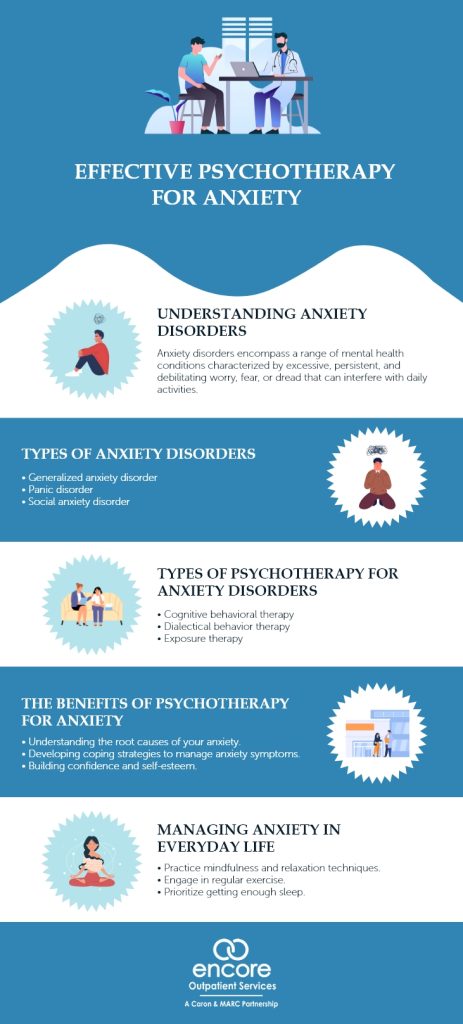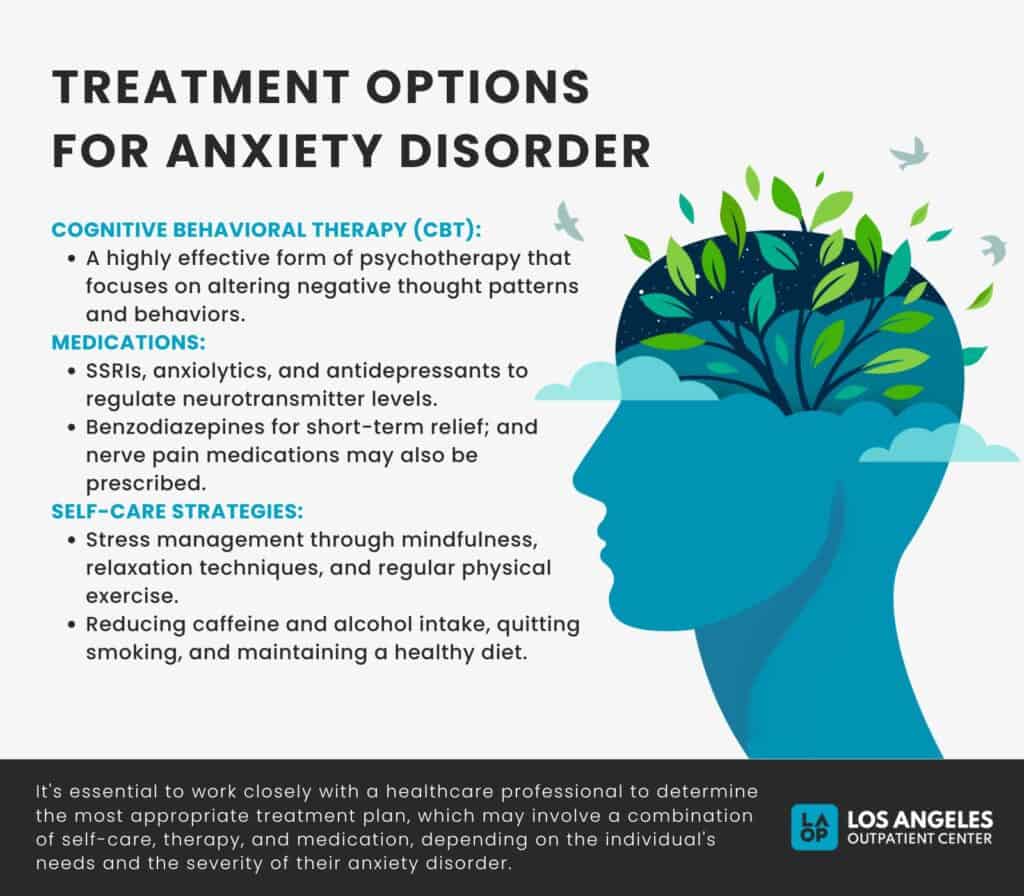Checking Out Various Methods in Counselling for Stress And Anxiety Disorder for Enduring Change
When tackling anxiousness conditions, it's important to check out a selection of therapy strategies. Each approach offers special insights and tools to help you manage your symptoms successfully. You could discover that incorporating methods can generate the ideal results. Nevertheless, recognizing the subtleties of these methods is essential to cultivating long lasting adjustment. What happens if the appropriate mix could launch a new level of psychological health for you?
Recognizing Anxiety Disorders: A Short Review
Stress and anxiety disorders, which impact countless individuals worldwide, can greatly affect day-to-day life. You might experience overwhelming feelings of anxiety or fret that appear irrepressible. These sensations can bring about physical signs like an auto racing heart, sweating, or perhaps wooziness. Common types of stress and anxiety disorders include generalized stress and anxiety condition, panic condition, and social stress and anxiety disorder. Each has special signs, however they all share a tendency to disrupt your regular and relationships.Understanding the source of your anxiousness is essential. It might stem from genetics, brain chemistry, or life experiences. Identifying your triggers can assist you manage your actions much better. It is necessary to bear in mind that you're not the only one in this battle. Many individuals face similar obstacles, and seeking aid is a solid action toward feeling much better. By discovering stress and anxiety problems, you're currently on the path to understanding and managing your problem more efficiently.
Cognitive-Behavioral Therapy: Challenging Adverse Idea Patterns
In Cognitive-Behavioral Therapy, you'll start by identifying the adverse idea causes that add to your anxiety. Counseling services for anxiety. When you acknowledge these thoughts, you'll work with changing them with even more favorable alternatives. Together, you'll develop reliable coping methods to assist handle your stress and anxiety in day-to-day circumstances

Recognizing Negative Thought Triggers
Acknowledging the specific triggers behind your adverse thoughts can be necessary in taking care of anxiousness when you experience moments of distress. Begin by paying interest to scenarios that prompt feelings of concern or anxiety. Is it a jampacked space, an upcoming deadline, or a discussion with specific people? Write down these circumstances in a journal. This will certainly help you determine patterns in your thinking. Additionally, notice physical experiences that accompany your negative ideas, like a racing heart or rigidity in your chest. By identifying these triggers, you obtain insight into what's sustaining your stress and anxiety. Comprehending these links is the initial step in testing those ideas and inevitably restoring control over your psychological responses.
Replacing Thoughts With Positives
Challenging adverse thought patterns is an important action in transforming your state of mind and lowering anxiety. You may typically locate yourself entraped in cycles of self-doubt or devastating thinking. As opposed to allowing these ideas dictate your feelings, technique replacing them with realistic choices or favorable affirmations. When you assume, "I can't handle this," shift it to, "I can take care of challenges one step at a time." This easy modification can greatly affect your mood. Regularly determining and responding to these unfavorable ideas assists produce a much healthier inner discussion. Keep in mind, it takes time and effort, however continually exercising this technique can lead to long-term adjustment, empowering you to face stress and anxiety with restored confidence and resilience.
Structure Coping Techniques With Each Other

Mindfulness and Acceptance-Based Approaches: Cultivating Present-Moment Recognition
As you browse the intricacies of anxiety, including mindfulness and acceptance-based approaches can considerably improve your capability to grow present-moment recognition. By concentrating on the present moment, you'll locate that you can observe your thoughts and sensations without judgment. This practice helps you acknowledge your anxiousness without feeling overwhelmed by it.Engaging in mindfulness exercises, such as deep breathing, body scans, or directed meditations, permits you to ground on your own in your present experience. Acceptance-based techniques motivate you to embrace your emotions instead than fight against them. When you accept your sensations, they shed their power over you.Incorporating these techniques into your everyday regimen can transform just how you react to stress and anxiety. You'll develop strength and learn to navigate demanding scenarios with greater simplicity. Eventually, cultivating present-moment awareness lays the foundation for enduring change, empowering you to lead a more meeting life.
Exposure Therapy: Confronting Fears Gradually
Direct exposure treatment helps you face your worries in a progressive means, making it less overwhelming. You'll learn techniques to face anxiety-provoking situations action by action, while also building coping techniques to manage your reactions (Counseling services for anxiety). This approach empowers you to take control and reduce anxiousness gradually
Progressive Direct Exposure Methods
When encountering stress and anxiety, slowly confronting your worries can be an effective means to gain back control. This method, called progressive direct exposure, includes gradually subjecting on your own to the circumstances or items that cause your stress and anxiety. Beginning with much less intimidating situations and gradually function your way as much as more difficult ones. For circumstances, if you're scared of public talking, you could start by talking before a mirror, after that advance to sharing ideas with a good friend, and eventually address a tiny group. Each action helps desensitize you to the anxiety, developing your self-confidence with time. Remember, it's vital to speed on your own and commemorate tiny victories as you move with this procedure, enhancing your capability to take care of anxiety successfully.
Building Coping Strategies
Structure reliable coping strategies is crucial for taking care of anxiety, especially as you confront your worries slowly. One effective approach is direct exposure treatment, where you begin by facing your worries in a regulated fashion. Begin with less frightening circumstances and gradually work your means as much as more challenging circumstances. This steady exposure helps desensitize you to stress and anxiety causes, making them less overwhelming.Incorporate relaxation techniques, such as deep breathing or mindfulness, to calm your mind during direct exposure. Track your development, celebrating small victories along the method to improve your confidence. Remember, it's all right to take your time; the goal isn't excellence but constant enhancement. By constructing these methods, you'll empower yourself to browse stress and anxiety and welcome life more totally.
Psychodynamic Therapy: Discovering Source of Anxiousness
Psychodynamic therapy explores the subconscious mind, revealing the origin of your anxiety. By examining your ideas, feelings, and previous experiences, this approach aids you discover look what i found underlying disputes and unresolved concerns that may add to your current anxiety. You'll deal with a therapist to check out childhood years experiences, connections, and psychological patterns that shape your actions today.As you gain insight into these deeper layers of your psyche, you'll start to recognize how previous events affect your existing actions. This understanding can cause catharsis, permitting you to refine emotions you might have suppressed.Through the therapeutic connection, you can also recognize defense reaction that may have developed over time, providing a clearer path to alter. Inevitably, psychodynamic treatment equips you with the tools to address your anxiety at its core, promoting long lasting improvement in your emotional well-being.
Integrative and All Natural Approaches: Incorporating Strategies for Greater Efficacy
Integrating different restorative methods can improve your trip toward handling stress and anxiety better (Counseling services for anxiety). By incorporating components from cognitive-behavioral therapy, mindfulness practices, and holistic strategies, you can produce an individualized strategy that resolves your unique requirements. For example, you may use cognitive-behavioral techniques to test negative thought patterns while incorporating mindfulness exercises to ground on your own in the present moment.Additionally, exploring alternative techniques such as yoga exercise or reflection can advertise leisure and minimize anxiousness signs. This mix allows you to establish higher self-awareness and resilience.Experimenting with these diverse techniques can assist you discover what resonates most with you. Remember, it's concerning locating a synergy that functions, rather than adhering to a solitary approach. This integrative approach not only offers prompt relief however also fosters long-term skills for managing anxiety, encouraging you to recover control over your life

The Role of Support Equipments: Building Strength With Link
While it may appear that managing anxiety is a solitary trip, having a solid support group can play a vital duty in your durability. Bordering yourself with empathetic friends, household, or support system creates a safe room where you can openly share your feelings and experiences. You advise on your own that you're not alone in this struggle.These connections use encouragement and can supply practical coping methods that have actually worked for others when you link with others. It's also a possibility to obtain perspective; close friends can help you see circumstances differently, minimizing sensations of isolation.Moreover, emotional support promotes a sense of belonging, which can considerably relieve anxiousness signs. By leaning on your support system, you can develop strength and take on difficulties a lot more effectively. Remember, connecting for assistance suggests toughness, and it can make all the distinction in your trip towards managing stress and anxiety.
Often Asked Inquiries

What Are the Typical Symptoms of Anxiousness Problems?
You might experience uneasyness, fatigue, problem concentrating, irritation, muscle tension, and sleep disruptions. Physical signs and symptoms can consist of rapid heartbeat, sweating, and shivering. Acknowledging these indicators early can help you seek ideal support and therapy.
How Much Time Does Therapy Normally Last for Stress And Anxiety Problems?
Therapy for stress and anxiety problems usually lasts anywhere from a few weeks to numerous months. It really depends upon your specific needs, development, and the strategies your specialist uses to assist you handle your stress and anxiety successfully.
Can Medication Be Used Along With Therapy for Anxiety?
Yes, medicine can most definitely be used together with treatment for anxiety. Combining both techniques often enhances treatment efficiency, aiding you manage symptoms while checking out underlying problems via counseling. Always consult your doctor for customized recommendations.
Exist Self-Help Approaches for Managing Anxiousness?
Yes, there are several self-help techniques for handling stress and anxiety. You can practice mindfulness, engage in routine exercise, maintain a balanced diet, establish a regular, and utilize deep breathing methods to help in reducing anxiousness signs properly.
Exactly how Do I Know if I Required Professional Assistance for Anxiousness?
You ought to take into consideration seeking specialist assistance for stress and anxiety if it interferes with life, creates considerable distress, or if self-help approaches aren't functioning. Trust fund your reactions; getting to out can bring about far better coping skills and support. Common types of anxiety disorders consist of generalized anxiousness condition, panic condition, and social anxiety disorder. When you encounter minutes of distress, recognizing the details triggers behind your unfavorable thoughts can be necessary in taking care of stress and anxiety. Replacing adverse thoughts is just the beginning of managing anxiety properly. By examining your ideas, feelings, and previous experiences, this technique assists you discover underlying problems and unresolved concerns that may add to your current anxiousness. It's also an opportunity to acquire viewpoint; good friends can help you see scenarios in a different way, reducing feelings of isolation.Moreover, psychological support cultivates a sense of belonging, which can substantially alleviate anxiousness symptoms.